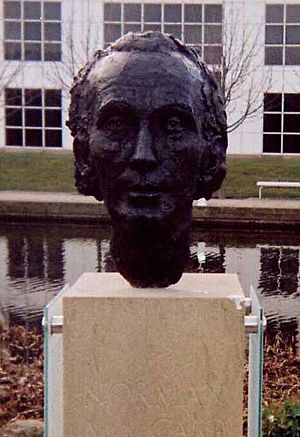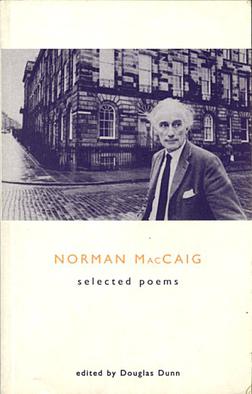Norman MacCaig facts for kids
Quick facts for kids
Norman MacCaig
|
|
|---|---|

Bust of MacCaig at Edinburgh Park
|
|
| Born | Norman Alexander McCaig 14 November 1910 Edinburgh, Scotland |
| Died | 23 January 1996 (aged 85) Edinburgh |
| Occupation | Poet, teacher |
| Language | English |
| Nationality | Scottish |
| Alma mater | University of Edinburgh |
| Literary movement | New Apocalyptics |
| Notable awards |
|
| Spouse |
Isabel Robina Munro
(m. 1940; died 1990) |
| Children | 2 |
Norman Alexander MacCaig (1910–1996) was a famous Scottish poet and teacher. His poems were known for being funny, easy to understand, and very popular. He wrote in modern English.
Contents
Life of Norman MacCaig
Norman Alexander MacCaig was born in Edinburgh, Scotland, on November 14, 1910. His father, Robert, was a chemist, and his mother, Joan, was from the Outer Hebrides. Norman was their only son and fourth child.
He went to the Royal High School and then studied classics at the University of Edinburgh. He graduated in 1932. For the rest of his life, he split his time between Edinburgh and Assynt in the Scottish Highlands.
During the Second World War, MacCaig chose not to fight. This was a personal decision, and he became known for his peaceful views. For many years, he worked as a teacher in primary schools.
In 1967, he became a special writer at Edinburgh University. Later, in 1970, he taught poetry at the University of Stirling. He often spent his summer holidays in places like Achmelvich and Inverkirkaig, near Lochinver.
His first collection of poems, Far Cry, came out in 1943. He wrote many poems throughout his life. After he passed away, even more unpublished poems were found. Norman MacCaig often read his poems aloud in public. These readings were very popular and helped many people discover his work. He was also good friends with other Scottish poets, like Hugh MacDiarmid.
Norman MacCaig's Work
Early Poems
Norman MacCaig's first two books of poetry were influenced by a style popular in the 1930s and 1940s. However, he later felt these early works were unclear and not his best.
His poetry truly changed when he published Riding Lights in 1955. This new collection was very different. The poems were clear, well-structured, and often rhymed. Even though his style fit with some other poets of the time, he remained unique. He was sometimes called a "Metaphysical" poet, a style he admired.
Later Poems
As he continued writing, MacCaig made his poems a bit less formal. He started using free verse, which means poems without strict rhymes or rhythms. This change happened with his book Surroundings in 1966.
Famous poets praised his work. Seamus Heaney said his poems were "an ongoing education in the marvellous possibilities of lyric poetry." Ted Hughes noted how fresh and alive his poems always felt. MacCaig also said that poet Louis MacNeice greatly influenced him.
Even though he always kept his sense of humor, some of his very last poems were more serious. This was especially true after his wife passed away in 1990. These poems showed sadness but never became hopeless.
Here is an example from his poem "Praise of a Man":
The beneficent lights dim
but don't vanish.
The razory edges
dull, but still cut.
He's gone:
but you can see
his tracks still, in the snow of the world.
A line from MacCaig's poem "Moorings" is even on the back of the new 10-pound polymer banknote from the Royal Bank of Scotland.
Awards and Recognition
Norman MacCaig received several important awards for his poetry:
- 1985: Queen's Gold Medal for Poetry
- 1979: Order of the British Empire (OBE)
- 1975: Cholmondeley Award
 | William Lucy |
 | Charles Hayes |
 | Cleveland Robinson |


